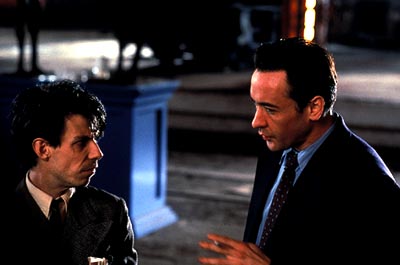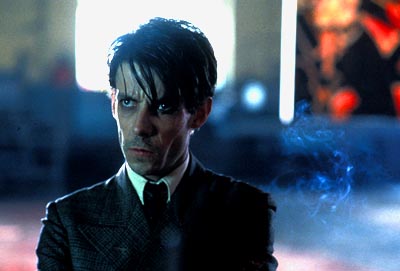

All of the furor (argh..reviewer..resisting..urge..for..bad..pun) surrounding Max is all for naught. It has an interesting premise, but cannot find its focus or maintain its momentum, resulting in more of a movie that might have been rather than a good movie. Max takes place in post World War I Germany, and is about Max Rothman, a German Jew who is an art dealer and fought for Germany in the war, losing an arm in the process. Well, sort of. It's also about another war veteran, some guy named Adolf Hitler, who is a struggling artist. Or, it's about the relationship between Rothman and Hitler, or a possible reason as to why Hitler became what he was, or how the relationship affected Max. Or, a little bit of all of them. Either way, it never really works.
Hitler (Noah Taylor, Vanilla Sky, Tomb Raider) approaches Max (John Cusack, Adaptation, Serendipity) in the hopes that Max will display and sell Hitler's work in his gallery. Max finds Hitler's work promising, but lacking true emotion or vision. Hitler has passion, but is not applying it towards his art. Both were scarred by the brutality of war, and Max sees in Hitler a kindred spirit. He feels sorry for Hitler, because while Max has a supporting family (and a mistress), Hitler has nobody. However, Germany is changing, and fascism is beginning to rear its ugly head. Captain Mayr (Ulrich Thomsen, The Weight of Water, Mostly Martha) sees this passion in Hitler, and wants Hitler to begin speaking out against Jews. Max becomes a sort of tug-of-war for Hitler's soul (guess who wins?). Most of the scenes involving Max and his family are dull. They never really go anywhere and fail to shed any meaningful light on his character. This especially includes a strange performance art type piece that occurs near the end of the film.
This is the first time out directing for Menno Meyjes (The Siege, Foreign Student), who also wrote the screenplay. It becomes a sort of 'wink, wink, nudge, nudge" type work, because everybody and their mom knows what is going to happen. This is Meyjes' little "what if" scenario, and it feels like he is trying to be clever (doesn't quite turn out that way). He sometimes comes dangerously close to trivializing Hitler, but one must remember that as abhorrent as he became, he may have indeed started of as someone different. To this effect, Taylor gives a good, creepy performance as a truly tortured artist, lonely, ignored, and pretty much a loser. He embraces Mayr because he likes the power that his words have on those around him.